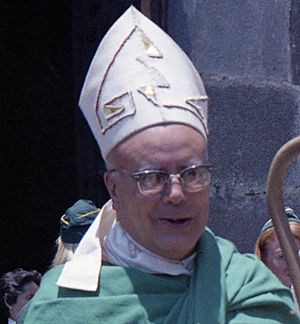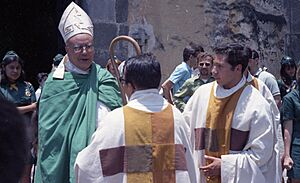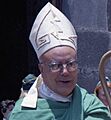Sergio Méndez Arceo facts for kids
Quick facts for kids Bishop Sergio Méndez Arceo |
|
|---|---|

Bishop, human rights activist
|
|
| Diocese | Cuernavaca |
| Appointed | 1953 |
| Predecessor | Alfonso Espino y Silva |
| Successor | Juan Jesús Posadas Ocampo |
| Other posts | Seminary professor |
| Orders | |
| Consecration | 1953 |
| Personal details | |
| Born | Tlalpan, Mexico |
| Died | February 5, 1992 (aged 84) Morelos, Mexico |
| Denomination | Catholic |
| Education | Pontifical Gregorian University |
Sergio Méndez Arceo (born October 28, 1907, in Tlalpan – died February 5, 1992, in Morelos) was an important Mexican Roman Catholic bishop. He was also a strong activist and supporter of human rights.
Méndez Arceo came from a wealthy family. His father was a successful lawyer. His uncle was a well-known archbishop. Sergio Méndez Arceo studied at the Pontifical Gregorian University in Rome. Later, he taught at a Seminary in Mexico. In 1953, he became the Roman Catholic Bishop of Cuernavaca, Morelos. He served in this role until 1983.
Contents
Community Church Groups
Sergio Méndez Arceo was the Bishop of the Cuernavaca area. He is often recognized for helping basic ecclesial communities (CEBs) grow in Mexico. These groups are called Spanish: Comunidades Eclesiales de Base in Spanish.
The first CEB groups in Mexico started in 1967. By the 1970s, many CEBs were active across Mexico. Most of them were in rural areas. The rest were in working-class parts of cities.
Méndez Arceo and the CEBs focused less on the church's strict rules. Instead, they wanted more open talks. They encouraged dialogue between church leaders and regular community members. CEB members would meet with priests. They discussed social, political, and economic issues. After these meetings, priests would talk with Méndez Arceo weekly. They worked together to find solutions for the community's problems.
The growth of CEBs made Cuernavaca a center for church changes. Méndez Arceo once said: "I must show that a true Christian has to speak out against injustice." He believed this was especially true for unfair systems.
CIDOC: A Special Center
Méndez Arceo supported Ivan Illich, an Austrian philosopher. Together, they set up the Intercultural Documentation Center (Spanish: Centro Intercultural de Documentación) (CIDOC). This center was created in Cuernavaca in 1961.
Illich reportedly told Méndez Arceo, "I want to start a center to help people understand other cultures better." CIDOC was a research center. It also offered language classes. Missionaries from North America studied there. Volunteers from the Alliance for Progress program also attended.
Illich wanted to challenge the Vatican's role in "modern development" in poorer countries. He believed the Church should act as a guest in other nations. He shared this idea through the center. Some conservative church members did not like the school. For a while, they stopped clergy from studying there. However, Méndez Arceo went to Rome. He explained the importance of CIDOC. The ban was then changed. Priests and nuns could study at CIDOC. Their supervisors just needed to monitor their progress.
Liberation Theology and Social Justice
During the Second Vatican Council, Méndez Arceo made a request. He asked the Pope to lift the excommunication for Freemasons.
Sergio Méndez Arceo believed in liberation theology. This idea focuses on helping the poor and oppressed. Because of his views, he was sometimes called the "Red Bishop." Some also called him a "supporter of socialism." In 1970, Méndez Arceo stated that "Christianity and socialism can exist together."
He encouraged the Mexican president, Luis Echeverría, to form a special committee. This committee would look at Mexico's biggest social and economic problems. President Echeverría saw Arceo as a leading voice for liberation theology. He liked Arceo's focus on sharing wealth with the poor. Echeverría thought clergy could help Mexicans organize themselves in a capitalist society. Arceo believed that labor unions were key to community organizing. Workers he supported called him "Don Sergio," a respectful title in Spanish.
In April 1972, Méndez Arceo went to a conference in Santiago de Chile. It was called "Christians for Socialism." He was the only Mexican bishop to attend. This meeting was the first of its kind in the continent. It brought together Catholics and Protestants. The conference members were seen as very progressive. They tried to combine Christian beliefs with socialist ideas. The Chilean bishops soon banned the gathering.
After he retired, Méndez Arceo started the Center for Meetings and Dialogue (CED). It was in Cuernavaca. The CED helps other social and activist groups in Morelos. Its role was to continue his work in liberation theology. Today, the CED helps progressive community groups. It also hosts meetings on topics like women's rights, human rights, education, and protecting the environment.
Championing Human Rights
Sergio Méndez Arceo strongly supported the Vatican II principles. These principles called for changes in church rituals. They also emphasized studying the bible more. And they encouraged using social studies to improve church organization.
Méndez Arceo tried to get the Mexican Conference of Bishops to investigate. He wanted them to look into the violent actions against student movements in 1968. This event is known as Mexico 68. Without the support of other bishops, Méndez Arceo helped the students who were put in prison. These students were often called political prisoners. This happened after the Tlatelolco Plaza massacre.
In January 1970, he told his fellow bishops about the prisoners' condition. However, the bishops did not mention the massacre itself. They also did not discuss its outcome. This was because they wanted to avoid conflict with the government. Méndez Arceo also got involved in other social movements. These included striking workers in Cuernavaca and guerrillas from Guerrero. The bishops' lack of action against social repression led many clergy members to change their focus. They shifted from schools for the wealthy to social action programs.
Méndez Arceo visited Cuba. There, he received the Orden de la Solidaridad from Fidel Castro. This award was for his efforts against unfair global systems. After his trip to Cuba, he began to support "democratic socialism."
Criticism and Legacy
Some people believed Sergio Méndez Arceo's actions were too controversial. They thought this made it hard for him to work with other Mexican bishops. They also said he made his diocese too political. And that he was against the government. However, Roderic Ai Camp, in his book Crossing Swords: Politics and Religion in Mexico, disagreed. He stated that facts showed religion in Cuernavaca was linked to more support for the ruling party. This party was the Institutional Revolutionary Party (Spanish: Partido Revolucionario Institucional) (PRI).
When Méndez Arceo retired in 1983, the Vatican sent new bishops. These bishops were not supportive of his work. They aimed to reverse many of his changes. Juan Jesús Posadas Ocampo became the new bishop of Cuernavaca.
Later, it was reported that the United States Federal Bureau of Investigation (FBI) had a report on Méndez Arceo. The report claimed he was friendly with certain groups. These included the Farabundo Martí National Liberation Front (Spanish: Frente Farabundo Martí para la Liberación Nacional) (FMLN) in El Salvador. It also mentioned the Sandinista National Liberation Front (Spanish: Frente Sandinista de Liberación Nacional)(FSLN) in Nicaragua. The FSLN took power in 1979. The FBI also suggested that Méndez Arceo's diocese collected information. They also claimed it bought and sold guns. And that it acted as messengers for certain groups in El Salvador. Méndez Arceo was also accused of being contacted by the Soviet Union's Committee for State Security (Russian: Komityet Gosudarstvennoy Bezopasnosti) (KGB). And by Cuba's General Intelligence Directorate (Spanish: Dirección General de Inteligencia) (DGI).
See also
 In Spanish: Sergio Méndez Arceo para niños
In Spanish: Sergio Méndez Arceo para niños
- List of people from Morelos, Mexico
Images for kids
 | William L. Dawson |
 | W. E. B. Du Bois |
 | Harry Belafonte |



